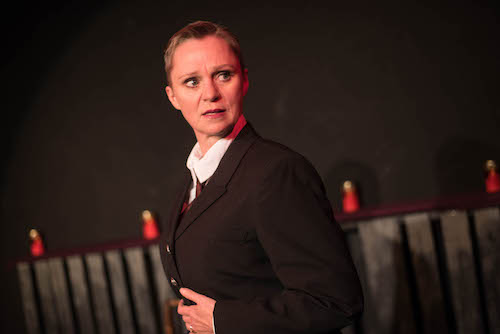 Toronto’s Thought for Food re-imagines Shakespeare’s play Measure for Measure as a Weimar era cabaret
Toronto’s Thought for Food re-imagines Shakespeare’s play Measure for Measure as a Weimar era cabaret
For Thought for Food’s stylish and passionate, all-female production of Shakespeare‘s Measure for Measure, the Red Sandcastle Theatre has been transformed into a Weimar Republic era cabaret. The ladies—of all ages, shapes and sizes—ply you with offers of song and drink, which they provide, and prime your senses for a tale of corrupt politics and lust.
With the moody red lighting, black bustiers and general camaraderie, the atmosphere is rich and compelling. By the time I heard the first bit of Shakespearean verse, I was already so captivated I had almost forgotten I was there for a play. They take their time building this world and its fluidity of gender.
The characters in the story deal with conflicting notions of vice and virtue. This production feels very relevant as it explores sex and society by blurring gender lines and playing off the notion that the masculine/feminine dichotomy is a construct—arguably a restrictive one.
When vice and decadence threaten the order of his city, the Duke of Vienna decides to put all responsibility into the hands of the harsh and moralistic Lord Angelo. He then disguises himself as a Friar to watch events unfold.
As his first act of power, Angelo condemns a young noblemen, Claudio, to death for pre-marital sex. Claudio’s sister, Isabella, soon to be a nun, goes to Angelo to pleads for her brother’s life. The stern and “proper” Angelo, lusting after Isabella, is forced to reconcile his lust with the law and order he is trying to enforce.
There is a multitude of characters watching from the sidelines as this main drama unfolds. Tensions mount and a rift forms between the government of the city and the people who make their living by dealing in “vice.”
Is Measure for Measure a comedy? Well, I don’t think so. Is it often funny? Yes, but it’s never really cheerful or uplifting because the circumstances are so severe and the characters so deeply anxious. Structurally, the ending seems almost comedic because a “fool” (the Duke revealing that he has been in disguise the whole time) sets everything “right” in the end, but not everybody is happy, nor should they be.
Fear not, this show isn’t too sombre or depressing. While not played entirely for laughs, the framing device of the cabaret show and composer Melissa Morris’s sultry live music does make everything feel charming and fun.
Director Tyler Seguin makes some very inventive use of Holly Meyer-Dymny’s utilitarian set. When Claudio is in prison, for example, the upturned legs of some bar stools serve as a cell. There is also some very evocative, sparingly used shadow play for brief, key moments of backstory or to depict important interactions not depicted on stage.
What a cast! The entire ensemble does exceptional work. Because of the smallness of the venue, you can appreciate all the vocal and physical nuances.
The most fireworks occur between Deborah Drakeford’s Angelo and Helen Juvonen’s Isabella.
Angelo is described by in the play as “precise.” This important aspect of the character is conveyed perfectly in Drakeford’s stiff, unyielding body language and her fitted, conservative suit. When Angelo feels confident and righteous, Drakeford is sharp and intimidating with her austere, dominant delivery. When faced with Juvonen’s gentle yet deeply persuasive reproaches, however, you can see in her nuanced posture and expressive face that her confidence is, indeed, a facade. When that vulnerability shows through, it’s like a oppressive weight has been lifted from the entire room.
I also throughly enjoyed Genevieve Adam’s Lucio. He is a friend of Claudio’s and, while not an outright villain, he is a troublemaker. Adam has such charisma that even in Lucio’s most despicable moments, I couldn’t help but want her to go on talking.
Thought for Food’s Measure for Measure is an immersive, sensual experience. I loved everything about it!
Details:
- Measure for Measure is playing until December 4, 2016 at Red Sandcastle Theatre (922 Queen Street East)
- Shows run Tuesday to Sunday at 7:30pm
- Tickets are $15 to $25
- Tickets can be purchased at the door or via Brown Paper Tickets
Photo of Deborah Drakeford by Dahlia Katz.
